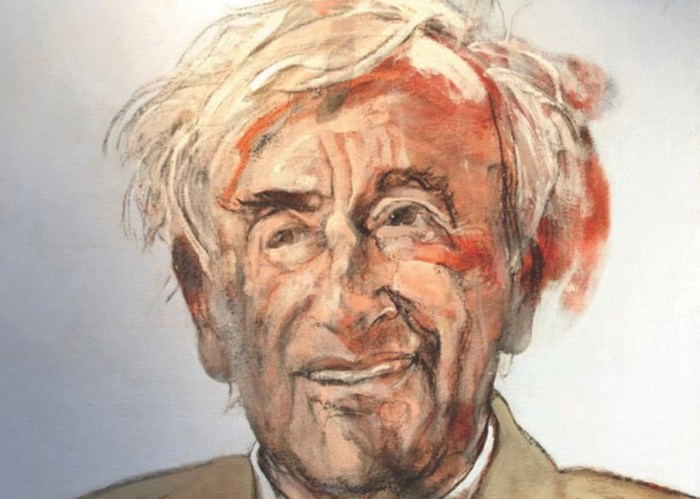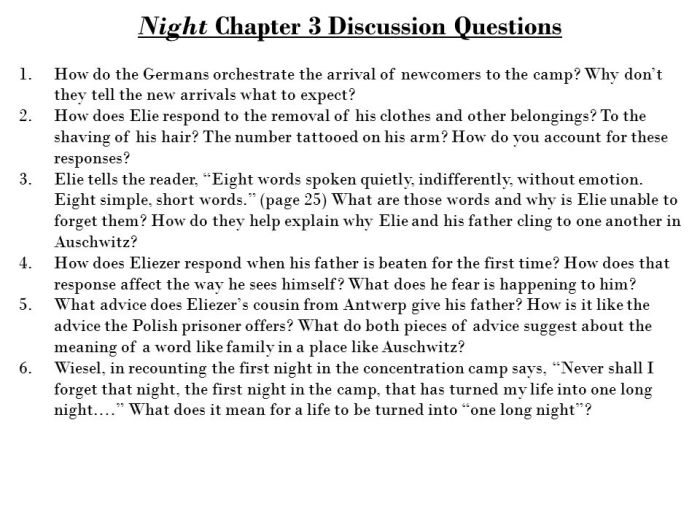Discussion questions for night by elie wiesel – Discussion questions for Elie Wiesel’s “Night” ignite a profound exploration into a narrative that unravels the harrowing realities of the Holocaust. This seminal work, deeply rooted in Wiesel’s personal experiences, invites readers to delve into the depths of humanity’s darkest chapter and grapple with its enduring legacy.
Through an examination of key themes, character development, and the novel’s unique narrative structure, these questions guide readers in unraveling the complexities of Wiesel’s powerful storytelling. Prepare to engage in thought-provoking discussions that challenge perspectives, evoke empathy, and shed light on the enduring impact of the Holocaust.
The Importance of Elie Wiesel’s Night

Elie Wiesel’s Nightholds immense significance in the realm of Holocaust literature. As a poignant and deeply personal account of the horrors endured during the Holocaust, it serves as a powerful testament to the resilience of the human spirit in the face of unimaginable suffering.
Wiesel’s Personal Experiences
Wiesel’s own experiences as a Holocaust survivor lend an unparalleled authenticity to Night. His vivid and harrowing portrayal of life in Auschwitz and Buchenwald concentration camps resonates with readers on a profound level, providing a firsthand account of the atrocities committed during the Holocaust.
Understanding the Holocaust
Nightplays a crucial role in deepening our understanding of the Holocaust. Through its unflinching portrayal of the systematic dehumanization and extermination of millions of Jews, the novel exposes the depths of human depravity and challenges readers to confront the darkest chapters of human history.
Key Themes in Night

Nightexplores a range of profound themes that delve into the complexities of human nature and the nature of evil.
Faith and Doubt
Wiesel examines the profound impact of the Holocaust on the faith of its victims. Characters struggle to reconcile their belief in a benevolent God with the horrors they witness, leading to both moments of doubt and renewed spiritual strength.
Humanity and Dehumanization
The novel confronts the ways in which the Holocaust systematically stripped victims of their humanity. Through its depiction of degrading conditions, physical abuse, and psychological torment, Nightreveals the insidious power of evil to corrupt and destroy.
The Nature of Evil
Wiesel grapples with the philosophical question of the nature of evil. He explores the role of individual choice, the responsibility of bystanders, and the limits of human compassion in the face of such atrocities.
Characterization in Night
Nightfeatures a cast of memorable characters whose experiences illuminate the diverse responses to the Holocaust.
Eliezer
The protagonist of the novel, Eliezer, represents the innocent victim who endures unimaginable suffering yet maintains a flicker of hope and faith.
His Father
Eliezer’s father embodies the figure of a loving and supportive parent who provides guidance and strength amidst the horrors of the camps.
Rabbi Eliahu, Discussion questions for night by elie wiesel
A respected religious leader, Rabbi Eliahu represents the struggle to reconcile faith with the atrocities witnessed during the Holocaust.
Narrative Structure and Style
Nightemploys a unique narrative structure and writing style that enhance its impact and emotional resonance.
Fragmented Storytelling
The novel is characterized by its fragmented and episodic structure, reflecting the chaotic and disorienting nature of the Holocaust experience.
Vivid Imagery and Symbolism
Wiesel uses vivid imagery and symbolism to convey the horrors of the camps. The use of metaphors, similes, and sensory details creates a visceral and unforgettable experience for the reader.
Stylistic Restraint
Despite the harrowing subject matter, Nightis written with a remarkable restraint and economy of language. Wiesel’s simple and direct prose amplifies the emotional impact of the narrative.
Historical and Cultural Context: Discussion Questions For Night By Elie Wiesel
Nightis deeply rooted in the historical and cultural context of the Holocaust.
Historical Events
The novel provides a detailed account of the events of the Holocaust, including the rise of Nazism, the establishment of concentration camps, and the systematic extermination of millions of Jews.
Jewish Culture and Identity
Nightexplores the impact of the Holocaust on Jewish culture and identity. It reveals the resilience of the Jewish spirit while also confronting the profound loss and trauma experienced by survivors.
Universal Significance
Despite its specific historical focus, Nighttranscends its time and place to become a universal story of human suffering, resilience, and the enduring power of hope.
Helpful Answers
What is the significance of “Night” in Holocaust literature?
As a firsthand account of the horrors of Auschwitz and Buchenwald, “Night” serves as a powerful testament to the suffering endured by Holocaust victims. It provides a unique and deeply personal perspective on the atrocities committed during this dark period in human history.
How does Wiesel’s personal experience shape the narrative of “Night”?
Wiesel’s own experiences as a Holocaust survivor lend an unparalleled authenticity and emotional depth to the novel. His firsthand knowledge of the horrors he depicts gives the narrative a visceral and deeply resonant quality, allowing readers to connect with the events on a profoundly personal level.